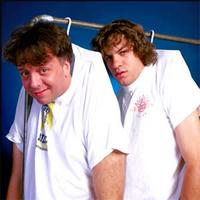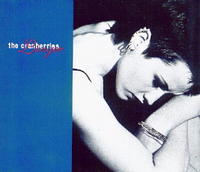
Mark Knopfler (vocals & guitars) wrote "Money for Nothing" after overhearing delivery men in a New York department store complain about their jobs while watching MTV. He wrote the song in the store sitting at a kitchen display they had set up. Many of the lyrics were things they actually said. Mark Knopfler : "The lead character in the song is a guy who works in the hardware department in a television/custom kitchen/refrigerator/microwave appliance store. He's singing the song. I had to ask for a pen and paper while I sat down in this mock kitchen display - which was in the front window of this kitchen electrical and appliance store - and tried to write the tune. In the back of the store, all the TVs were tuned into MTV".
The song was notable for a cameo appearance by Sting singing the song's introduction and backing chorus, a borrowing of the cable network's slogan "I want my MTV" (The line "I want my MTV" was the basis of the cable network's promotional campaign and they often played clips of musicians saying and screaming the line between videos). The songwriting credits are shared between Knopfler and Sting, though Sting has stated that his only contribution was the "I want my MTV" line, which was sung in partial parody of his own song "Don't stand so close to me", originally recorded by The Police. Sting did not want a songwriting credit for this, but his record company did because they would earn royalties from it.
Sting’s part was conceived after the basic tracks for the song were cut. As Neil Dorfsman (engineer) explains : "That was a happy accident. Sting was down in Montserrat while we were doing that song. He had come by to visit and had dinner with us one night, and I think after that Mark and I kind of looked at each other and thought, 'Let's get him on this record.' I'm not sure to this day if Mark had the 'I want my MTV' line written already or wrote it for Sting to be in the melody of [Sting's Police song] 'Don't stand so close to me'".
Knopfler's distinctive, crunchy guitar tone on the main body of the song was another accident. Dorfsman : "I would go out in the studio while Mark would play, and I'd have a couple of mics up on his amplifier ; the guys in the control room would be listening, and I'd move the mics around until it sounded pretty good to them in there. I'd usually use two mics, and I was positioning one and moving the other. It was sort of in a weird spot where you'd never put a microphone and everybody on the talkback said 'Stop! Come here and listen to this !' There was some weird phasing thing happening. I don't know what it was. But it sounded great and we did six or seven takes right away because I wasn't sure we'd ever get that exact tone again. I wrote it all down, but when we tried to better it in New York a month later, we never came close".
Also Dorfsman : "We did a lot of keyboard overdubbing on that song in particular ; we spent a lot of time on the sound and the part. I remember telling Guy Fletcher (keyboards) to treat that whole extended intro section as if it was a science fiction scene and there was a monster coming alive. Eventually we got something that approximated the idea I had. Mark was always looking for sounds that weren't stock, and was into buying keyboards that other people weren't using."
The video was the first to be aired on MTV Europe when the network started on August 1, 1987 (6 years after MTV US). The music video for the song featured early computer animation illustrating the lyrics. The video was one of the first uses of computer-animated human characters and was considered groundbreaking at the time of its release. The characters were supposed to have more detail, like buttons on their shirts, but they used up the budget and had to leave it as is.
Available on the album "Brothers In Arms" On songwriting, Billy Lunn, the young (19 years old) singer from up and coming band The Subways : "It usually differs as to how the songs come about. I mean, they come to me rather than me picking up a guitar and just stringing out ideas. I wrote a song at work on the back of a delivery receipt and it's now the title track for our album , so it's just generally life being put into music through me and the guitar". That song is the title track for their first album, "Young For Eternity".
On songwriting, Billy Lunn, the young (19 years old) singer from up and coming band The Subways : "It usually differs as to how the songs come about. I mean, they come to me rather than me picking up a guitar and just stringing out ideas. I wrote a song at work on the back of a delivery receipt and it's now the title track for our album , so it's just generally life being put into music through me and the guitar". That song is the title track for their first album, "Young For Eternity".





